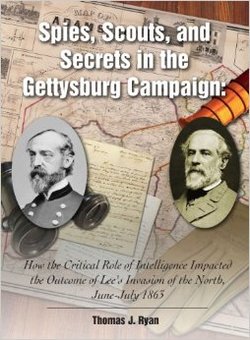
Thomas J. Ryan
Savas Beatie, 2015, 482pp., $32.95
ISBN: 978-1-61121-178-8
Image courtesy of amazon.com
There is no doubt in my mind that the Gettysburg Campaign is the most written about campaign and battle than any other in the American Civil War. In all of American History, the only campaign which rivals Gettysburg, I believe, is D-Day. All aspects of Gettysburg seemed to have been covered from the organization of the artillery to even, yes, the fences. When I saw this book coming, however, I was intrigued and looked into the subject. Scouting and espionage was not yet covered in depth in the campaign. Well now, the subject has been given due research and the product is amazing.
Thomas J. Ryan is the former president of the Central Delaware Civil War Round Table and a longtime member of the Gettysburg Foundation and Civil War Trust. He served three years in the United States Army and more than thirty years with the U.S. Department of Defense in various intelligence operations. He has published more than one hundred and twenty-five book reviews and articles on Civil War subjects, many of them dealing with the intelligence gathering of the war, and writes a bi-weekly column called “Civil War Profiles” for Coastal Point: a Delaware newspaper. He authored the essay, Delaware during the Civil War: A Political, Military and Social Perspective.
Many already know of the spy which set off the Battle of Gettysburg, Harrison. And for most people, the use of spies during the campaign ends there. But Ryan, within the first few pages of the book, gives you so much new information in the realm of espionage that it made me wonder why there were so little works devoted to intelligence. Much of the book dealt with the month of June in 1863 and the ways in which the armies were scouting each other. Ryan also tackles the task of chronicling the movements of General Stuart at this time bringing about some clarity to the subject, especially for new Gettysburg students. But it goes even further than that. Well-seasoned Gettysburg enthusiasts and students will find a great amount of new things in this work which have been masterfully researched by Ryan. While history has not been so kind to General Hooker, in this work, my opinion seemed to change on the man. Many have said that while Hooker was not a great military commander, he was an excellent organizer of military intelligence and you see it in this narrative. For people looking for a narrative of espionage during the battle, you will get a good narrative on that subject, but the true gem of this book is the before and after the battle. Both armies had good, and bad, ways in which they were scouting each other during this campaign and with the flowing narrative of the writer, you feel as though you were in the tent with the commanders during these important meetings. There is a level of excitement in the work which is not usually felt in Gettysburg books.
I highly recommend this book to anyone interested in the Gettysburg Campaign or even the American Civil War. Thomas J. Ryan handles the subject of intelligence gathering and espionage with a masterful hand. For those people who think that nothing new can be written about the Gettysburg Campaign, I ask you to read this book. The amount of information in this volume will send this work into the pantheon of Civil War writing. It is destined to become a classic.
 RSS Feed
RSS Feed
